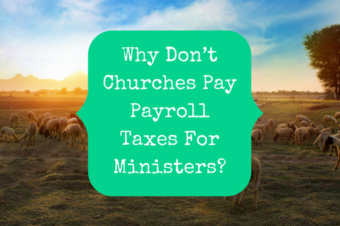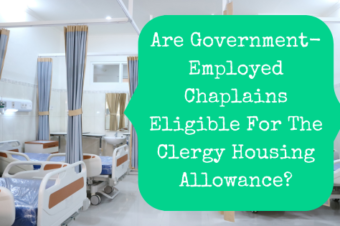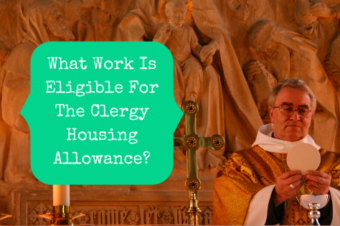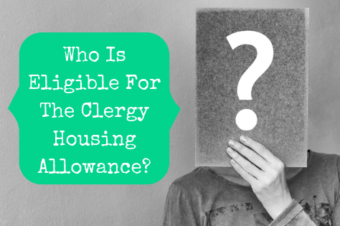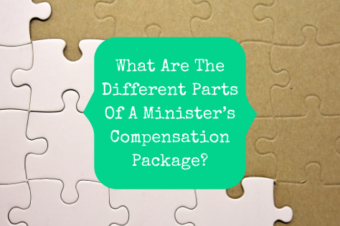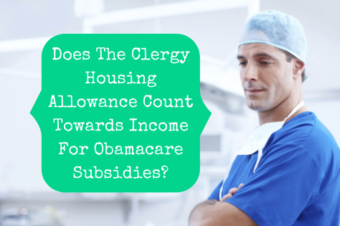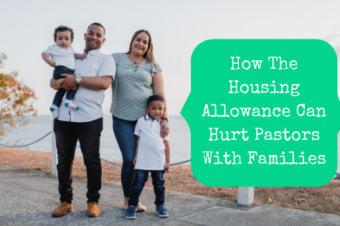Having a baby comes with a lot of responsibility and a long to-do list. Here are the things you should do legally and financially to set yourself up for success once your little one arrives.
What Are The Different Parts Of A Minister’s Compensation Package?
The Apostle Paul told Timothy in 1 Timothy 5:17-18 that “The elders who direct the affairs of the church well are worthy of double honor, especially those whose work is preaching and teaching. For Scripture says, “Do not muzzle an ox while it is treading out the grain,” and “The worker deserves his wages.” (NIV)
I agree. You are worth your wages. But what are your wages?
We commonly think of wages as simply your salary, what you get paid to work. However, compensation can be a whole lot more than just a salary. This is especially true for pastors because of the unique opportunities that you have access to. There are a number of different things that comprise compensation, but they can be broken into two basic categories: income and benefits.
Ministerial Income
Income is actual money that’s coming to you. It’s something tangible that you can put in your bank account.
Salary
A pastor’s salary isn’t much different than anyone else’s salary. It’s money that you get paid for doing a job. You have to pay taxes on the money and you get to do whatever you want with it.
Social Security & Medicare Offset
Pastors are dual-status taxpayers for Social Security purposes and thus have to pay both the employee and employer portions of that tax. If you’re not familiar with that, follow the link in the last sentence or none of this will make sense to you.
Some churches feel bad that pastors have to pay the employer portion of the Social Security and Medicare taxes and want to help them cover the cost. They calculate how much an employer would normally pay for the pastor, 7.65%, and pay that as additional salary. It is a nice gesture and definitely helpful to the pastor. Nevertheless, a Social Security and Medicare offset is simply additional taxable income in the eyes of the IRS.
Housing Allowance
Another type of income unique to ministers is the housing allowance. This site has all kinds of articles related to the housing allowance and I even wrote a book on it.
Basically, the housing allowance is income that is exempt from federal income taxation and can only be used for qualified housing expenses. It is also exempt from most state income taxes as well. Nevertheless, it is not exempt from Social Security & Medicare taxes.
Equity Allowance
The final type of pastoral income is specific to pastors who live in a parsonage. A parsonage is church-provided housing. As such, a pastor who lives in a parsonage does not have the opportunity to build home equity. When the ministry position is gone, the pastor has to start from scratch with housing.
This is the opposite experience for most Americans who purchase a home. As they pay down their mortgage and home values rise, their equity increases. Many people are able to pay off their mortgage by the time they retire so that they have lower housing expenses in retirement and a valuable asset that they can pull equity from if necessary.
Pastors who live in a parsonage often find themselves at retirement homeless and equity-less. To make up for that, many churches pay their pastors an equity allowance to help build towards purchasing a home in retirement. If they pay it directly to the pastor’s retirement account, it receives tax benefits and the pastor cannot access it for other things until retirement. If it is given as a cash payment, it is treated as taxable income by the IRS.
Ministerial Benefits
While income is money that you get, benefits are more of services or products provided to you. They are not cash and will not grow your bank account, but they are still very important to your overall financial life.
Health
One of the most valuable benefits that an employer can provide is health insurance. It is much more expensive to purchase health insurance as an individual than through a group policy. Also, premiums paid through an employer-sponsored health insurance plan are tax-free. Other health-related benefits that churches can provide to all of their employees are dental and vision insurance, health reimbursement arrangements, flexible spending accounts, or health savings accounts if in conjunction with a high-deductible health insurance plan.
Life Insurance
Another benefit that is helpful to both the pastor and the church (because they would want to care for the pastor’s family if anything happened) is life insurance. Up to $50,000 of group term life insurance can be provided tax-free and the premiums on any amounts above that are considered taxable income to the pastor (based on specific IRS calculations).
Disability Insurance
Most pastors are at greater risk of becoming disabled than dying. As such, disability insurance is a very valuable benefit. Like health insurance, it is also much more affordable when purchased as part of a group plan rather than as an individual.
Retirement Savings
A retirement savings account, usually a 403(b), is a benefit that has multiple advantages for pastors. Not only are pastors able to save for retirement pre-tax, but having a church-sponsored retirement plan makes it possible to claim a housing allowance in retirement and also entirely avoid paying Social Security and Medicare taxes on contributions.
Paid Leave
Even God took time to rest. As such, it is important for pastors to have access to paid leave (and a culture where they are encouraged to take it). It can be broken down in different ways, but paid leave can include sick days, holidays, vacation time, family leave, professional development, outside ministry, and sabbaticals. It is also important for the church to respect the pastor’s time off and pitch in to get work done while the pastor is away.
Parsonage
All of the other benefits (not income) listed here can be given to all church staff but a parsonage is only for ordained, licensed, or commissioned ministers. A parsonage is a church-owned home that a pastor gets to live in income tax-free.
Those are the different pieces that can be fit together to create a ministerial compensation package. Both pastors and their churches should understand these different components in order to create a tax-efficient compensation package that meets the pastor’s needs. Pastors, share this with whoever in your church makes salary decisions, whether it’s a board of directors, stewardship committee, an HR department, or whoever. Sit down and review it together to make sure your church is fulfilling 1 Timothy 5 to the best of its ability.
Are You Wasting Money Without A Health Savings Account?
Despite being a hot topic over the last couple of decades, the cost of health care is still a major problem for American families. Healthcare costs tripled between 2001 and 2016, and the average non-elderly family now pays $8,200, or 11% of their income, each year.
That is a national average where many people have employer-provided health insurance. Many churches cannot afford to pay as much of their pastors’ premiums or even offer health insurance at all. If you are without health insurance, it is open enrollment right now for the Affordable Care Act and you can sign up right now on the national exchange. You can also read about your other health insurance options here.
Even with insurance, most of us don’t have an extra $8,000+ just laying around for medical costs. It’s something we should be saving for on a regular basis so we can be prepared when something does come up. It can be hard to find the room in your budget to save for medical costs, but the government has provided something that makes saving towards health care costs a little bit easier and more cost-effective: Health Savings Accounts (HSAs).
What Is A Health Savings Account?
Back in 2003, the government established HSAs as a way for people covered under high-deductible health plans (HDHPs) to get special tax treatment for saving money for out-of-pocket medical expenses. By saving in an HSA, they received a tax benefit for planning ahead. As HDHPs gained in popularity, the government wanted to incentivize saving to cover the higher deductibles, so that medical events would not be financially devastating even with insurance in place.
What’s So Great About Health Savings Accounts?
There are two aspects of an HSA that make it especially attractive:
No Taxes On The Front End
First of all, you can contribute money to your HSA pre-tax. Because tax hasn’t been taken out, you end up with more to contribute. Many people have their HSA money withheld directly from their paycheck so that they never even see it or have to pay taxes on it. You don’t have to have it automatically withheld, though, you can just take a deduction when you file your taxes for the same result. Either way – save now or save later – you still save on taxes by contributing to an HSA.
No Taxes On The Back End
Not only do you save on taxes when you put money into an HSA, you save when you take it out as well. Distributions from an HSA are tax-free when used for qualified medical expenses.
This makes an HSA very unique among tax-advantaged government savings plans, like IRAs. Usually, you either contribute pre-tax but have to pay taxes on withdrawals, or you pay your taxes upfront before contributing and don’t get taxed on the withdrawals. Health Savings Accounts take the best of both kinds of plans to make a superiorly tax-advantaged savings vehicle.
Example Of Tax Savings
Let’s look at an example with real numbers. Ben and Dan each have $1,000 to save towards medical expenses. Ben saves in a regular savings account and Dan opens an HSA.
Before he can start saving, Ben has to pay his taxes, 20%, so he only has $800 to put into his account. His savings account earns him 0.1% a year. If he leaves it in there for 5 years, it will grow to an amazing $804.
Since Dan is using an HSA, he doesn’t pay taxes on his $1,000 and it all goes into the account. Because of this, even if he earns the same interest rate as Ben he’ll end up with $201 more than him, or $1,005 total. However, if he isn’t planning on using the money any time soon, he can likely earn a much better rate of return. Most HSAs offer a wide variety of investment options, from money market to stock mutual funds. And the best part is that you don’t have to pay any taxes on the interest you earn when used for qualified expenses.
Are You Eligible For A Health Savings Account?
These are the requirements to be eligible to open an HSA:
- You must be covered by an HDHP
- You cannot be enrolled in Medicare or other health coverage
- You cannot be claimed as a dependent on someone else’s tax return
HSAs cannot be joint accounts, they are individual accounts. If you are married, only one of you owns the account while the other can be an authorized user. When the account owner dies, the spouse gets to take over the account. The surviving spouse gets to use it as his or her own without paying any taxes (for qualified expenses) or penalties.
What Are The Contribution Rules?
As long as you are covered by an HDHP, anyone may make contributions to your HSA. This includes you, the account owner, your employer, any family member, or another third party, like a church or church member.
The 2020 contribution limits are $3,550 for singles and $7,100 for families, with a $1,000 catch-up contribution available to those over 55. Contributions for 2020 can be made all the way up to the tax filing deadline for the year, April 15, 2021. The limit will go up $50 for singles and $100 for families in 2021.
Once you are no longer covered by an HDHP, you can’t make anymore contributions. You can still use the funds in the account for eligible expenses, though.
What Can You Spend The Money On?
HSA money can be used for many things that aren’t usually covered by health insurance plans. A few examples are deductibles, co-insurance, prescriptions, dental care and vision care. Most things that would typically qualify for the medical expense deduction on your tax return qualify for an HSA.
For people over 65, qualified expenses include:
- Premiums for Medicare parts A, B, D and Medicare HMA
- The portion an employee pays for employer-sponsored health insurance
- The employee portion of employer-sponsored retiree health insurance
Supplemental policies like Medigap are not IRS qualified expenses.
It’s Not A Use-It-Or-Lose-It Account
It’s easy to confuse HSAs with FSAs (Flexible Savings Accounts) and all of the other acronyms the government uses. If you’re familiar with an FSA, you know that any unused funds in excess of $500 are forfeited at the end of the year.
Luckily, HSAs are different. Account balances simply roll over from year to year, allowing for incredible growth and accumulation of savings. As long as you are eligible, you can continue to contribute to your account tax-free and let the money grow tax-free for use at any time in the future, whether near or distant.
How Do I Open A Health Savings Account?
Now that you’ve seen how great they are, how do you get one? It’s as easy as opening a bank account, once you’ve chosen who you want to open it with. Just fill out the application and start depositing.
You can start HSAs with banks, brokers, credit unions and insurance companies. If you just Google “Open HSA,” you’ll see plenty of good options. Here is a good article with tips for choosing an HSA custodian, and this blog post lists some of the most popular ones along with their fees and investment options.
Good luck and happy savings!
Does The Clergy Housing Allowance Count Towards Income For The Premium Tax Credit?
A big part of the Affordable Care Act, or Obamacare, legislation was the creation of the Marketplace where people without access to a workplace health insurance plan could shop for and purchase an individual policy. This was good news for many independent pastors because a lot of small churches simply cannot afford to offer health care benefits.
How Obamacare Subsidies Work
Not only did Obamacare create the Marketplace but it also created government subsidies, or tax credits, to help people pay their premiums. Subsidy eligibility is based on income, beginning at 400% of the federal poverty level. For example, the federal poverty level for a family of 4 is $26,200 so if a 4-person family’s income is $104,800 or less, they should be eligible for a subsidy. Those at or below the poverty level are usually eligible for Medicaid instead of subsidies. Click on the link above to see the federal poverty level based on household size.
The subsidy is based on income during the year of coverage, so if you sign up for 2021 coverage today, you will need to estimate your 2021 income for them to calculate your subsidy. If you overestimate, you will have to pay back the excess at the end of the year. If you underestimate, then you could get additional tax credits at the end of the year.
How The Pastor’s Housing Allowance Affects Income
When it comes to income-based programs, pastors always have the same question: Does my housing allowance count as income? That’s a really good question to ask because the answer varies by program. For some things it does and for some things, it doesn’t. You can read all about that in my book about the housing allowance.
When it comes to the Premium Tax Credit, the official name for the Obamacare subsidy, the housing allowance DOES NOT count as income. This is the way that they calculate income:
Adjusted Gross Income (AGI)
+Non-Taxable Social Security Benefits
+Tax-Exempt Interest
+Excluded Foreign Income
=Modified Adjusted Gross Income (MAGI)
Your AGI comes from your tax return, Form 1040, and does not include the housing allowance. Neither is it added back in, like excluded foreign income, tax-exempt interest, and non-taxable Social Security benefits. This is the same calculation that they use when computing income for Medicaid and the Children’s Health Insurance Program (CHIP) as well.
Obamacare Open Enrollment Is Now
Open enrollment for 2021, when you can sign up for a new Marketplace plan, began yesterday and goes until December 15. So, if you need health insurance now is the time to get it. If you want to learn more about your options beyond the Obamacare Marketplace, read this article.

Health Insurance For Pastors: What Are Your Options?
We are nearing the end of open enrollment on the Obamacare healthcare exchanges. If you are not satisfied with your current health insurance (or lack thereof), now is the time to address it. Health insurance is a big topic among pastors because many churches do not have the resources to provide insurance the way large for-profit employers do.
What is a pastor to do? Here are your options, depending on whether or not your church is willing and able to help you out in this area.
On Your Own
Many churches struggle to pay their pastors a salary and only dream of being able to help with healthcare costs. If you’re serving one of those churches, you still have some options. While in the US healthcare is often tied to employment, it doesn’t have to be.
Pay Cash
The most basic option available to you is to just pay cash for your healthcare needs, the way you do for your groceries or haircuts. Healthcare costs a lot more than groceries and haircuts, though, so this is not a popular option. Also, some medical providers only work with insurance companies so your options may be limited if you self-pay. The Affordable Care Act, or Obamacare, imposed a penalty tax on people who just pay cash and don’t have insurance, but after 2018 that will be gone.
Health Sharing Ministry
A non-insurance option that exempts you from the Obamacare penalty is participating in a health sharing ministry. In a health sharing ministry, a group of people (usually Christians) help pay each other’s medical expenses.
With some, you pay a monthly fee to the organization and then they help cover your medical costs. With others, you send your money directly to the other members who have medical needs at the time. This follows more of an Acts 2 model where everyone helps to take care of each other. You can read more about the top medical sharing ministries and how they work here.
Individual Health Insurance
Another option is to buy your own individual health insurance. You can do this directly with a health insurance company or through the healthcare exchanges, or marketplaces, established by the Affordable Care Act.
If you purchase insurance through the marketplace, then you may also be eligible for premium tax credits to help offset the cost of your insurance premiums. Eligibility is based on income and family size. One nice thing for pastors is that the housing allowance does not count as income for the premium tax credit calculations.
Medicaid
If your income is low enough, you may be eligible for Medicaid, which is the government program that provides health insurance for low-income people. There is also CHIP, or the Children’s Health Insurance Program. It is another government program that does the same for children. As with the premium tax credits, your housing allowance is not included in income when calculating eligibility (unless eligibility is based on blindness, disability, or being over age 65).
Spouse’s Employer
The final way to get healthcare coverage on your own is to get it through your spouse’s employer. If your spouse works and has access to group health insurance, then that may very well be your best option.
If The Church Will Help
When your church is willing and able to help with your health insurance needs, then you have more options.
Informal Stipend
Some churches choose to simply give their pastor some extra money to go towards healthcare costs. All that the church provides is money, the pastor has to choose one of the above options and implement it.
This arrangement is nice in that the church is helping out and the pastor has complete freedom to make decisions. However, from a tax perspective, it is not very efficient. Because the payments made to the pastor are not a part of an IRS qualified plan, they are considered income and taxed accordingly. A $1,000 stipend can quickly dwindle down to $600 after federal and state income taxes and SECA (Social Security taxes).
Qualified Reimbursement
There are ways for a church to reimburse a pastor for healthcare expenses without having it count as taxable income. Health reimbursement arrangements (HRAs), also called health reimbursement accounts or personal care accounts, are set up according to IRS rules to do just that. Most churches would offer a solo employee HRA (for only covering 1 employee) or a qualified small employer health reimbursement arrangement (QSEHRA), which is designed for organizations with fewer than 50 employees.
This is how they work:
- The church sets a reimbursement allowance.
- The pastor pays for health expenses.
- The pastor submits proof of expenses to the church.
- The church reimburses the pastor for the expenses, up to the preset limit.
For QSEHRAs, the church must offer the same reimbursement to all eligible employees. The one exception is differentiating between single coverage and those with families. For 2019, the annual limit for single employees is $5,150 and for employees covering their families is $10,450. As long as the plan is offered fairly among employees and the expenses are qualified under IRS rules, then the reimbursement money is tax-free.
One thing to keep in mind, though, is that qualified reimbursements offset premium tax credits if you purchase insurance through the exchange. Your tax credit will be lowered based on your church’s reimbursement. Thus, you could end up in a situation where the church is simply paying instead of the government and the pastor receives no added benefit.
Group Health Insurance
Churches or denominations with the available resources can offer group health insurance just like many companies do. Group health coverage usually has lower premiums than individual insurance policies. This is because there is more room for negotiating and the risk is spread among more people.
Even if your denomination does not offer group insurance or your church cannot afford it on their own, you may be able to join with another group to reap the benefits of group insurance. Some churches are eligible to participate in group insurance through Christian organizations like Guidestone. Others have been able to obtain group coverage through organizations like their local chamber of commerce.
Obamacare Small Business Health Options Program
Another church-sponsored option is an Obamacare Small Business Health Options Program (SHOP). This works much like the individual insurance marketplace set up by Obamacare but is for small businesses (and churches). There are some participation requirements that churches must meet to participate and they would have to help cover the costs of the insurance as well.
Employer Medical Cost-Sharing Ministry
Just as there is a small business option on the Obamacare exchange, there are also options for churches among medical cost-sharing ministries. Two that offer them are Sedera and Aliera Healthcare.
Those are your options if you’re a pastor looking for health insurance. Remember, starting in 2019 there is no individual mandate, or penalty tax for not having insurance. It’s still a good idea to be covered, though. Hopefully, one of the options above is a good fit for you and your family.
Side Jobs For Pastors That Offer Benefits
Health insurance.
Tax-advantaged retirement accounts.
Vision insurance.
Wellness programs.
Dental insurance.
Matching retirement savings.
Disability insurance.
Tuition reimbursements.
Life insurance.
Annual bonus incentive plans.
Child care assistance.
Discounted merchandise.
These are some of the most common benefits that employers offer these days, and the list is ever growing. In fact, they can be the deciding factor for someone accepting a job offer in today’s tight labor market.
Unfortunately, many non-denominational pastors are on the outside looking in. If their church can scrape together enough to pay them a livable salary they are blessed. But, benefits? There’s just no way.
However, a lot of the benefits that big corporations offer are still needed by pastors. You still need health insurance. It would still be a big help to be able to save for retirement in a tax-advantaged account. It would still be wise to have life insurance.
How Independent Pastors Can Access Employee Benefits
How do you get them, though? It’s not like you’re going to leave the ministry just to have an employer that will pay for those things. Is there any other way for you to get your hands on some of these popular benefits that your church can’t afford to give you?
Yes. With a part-time side job. Whether it’s you or your spouse taking on the job, it could be a great way to access valuable employee benefits without leaving your church.
Traditionally benefits were only given to full-time workers, but there are a number of companies that are now offering some of their benefits to part-time workers as well. Here are some companies and types of companies that offer benefits for part-timers, but it is by no means comprehensive. Chances are, you can find a good local company wherever you are that would be willing to offer you benefits for part-time work.
Types Of Jobs That Offer Benefits To Part-Time Workers
Unions
When I was 16, I got a job as a courtesy clerk at a local grocery store and was therefore required to join the United Food & Commercial Workers Union. I didn’t like having to pay union dues as a teenager, but they provided me with health insurance for the first time in my life.
There are many unions out there that require employers to pay benefits to workers, no matter how many hours they work. Look around your neighborhood to see what unions are present and what kinds of benefits they offer. A good place to start is the grocery store.
Medical Providers
I have a friend who just got a job with a major medical provider. As an employee there, her health insurance is practically free. Already the mother of 4 boys, she says she’s tempted to have another baby just because it would only cost her $5. It’s hard to resist a deal like that!
Whether it’s Kaiser Permanente or your local hospital, many medical providers offer health benefits to all employees, because, well, that’s what they do. Across the spectrum from medical professionals to those who work in patient services, counseling, or administration, they take care of everyone. Often it’s not just health insurance they offer, either, but pensions and tuition assistance as well. Another perk: You don’t have to call a hotline for a nurse’s advice, you can just ask a coworker!
Federal Government
Whether you deliver mail for the USPS or work as a park ranger, you can get benefits by working for the federal government. Part-time work opportunities depend upon the government agency, but they are all eligible for benefits. You can read more about the benefits available from the US Office of Personnel Management here.
Companies That Offer Benefits To Part-Time Workers
Need more specific guidance? Here is a list of companies that offer benefits for part-time work. Each one offers different benefits and has different eligibility criteria, so follow the links of the ones that catch your attention to learn more:
- Costco
- Starbucks
- Chipotle
- Nike
- UPS
- JPMorgan Chase
- Lowe’s
- Aerotek
- Macy’s
- Staples
- Activision Blizzard
- FedEx
- Home Depot
- REI
- The Container Store
- Uber
- Whole Foods
- U Haul
Now, if you or your spouse decide to take on a side-job, don’t look at it as just a way to access their benefits. God has called us to be salt and light in this world, and there’s no better way to reach people than to work side by side with them on a daily basis. You can impact the world just as much, if not more, from behind a cash register as you do from behind a pulpit.
How Medicare Works For Pastors Who Have Opted Out Of Social Security
Most pastors who have opted out of Social Security understand that they are on their own for their retirement savings. That part is fairly straightforward. But what about Medicare? How does opting out of Social Security affect eligibility? What are the options available?
The Top 4 Medical Sharing Ministries & How They Work
Last week I introduced you to a little-known alternative to health insurance, medical sharing plans. Depending on your situation, they could be an affordable alternative to traditional health insurance.
There is no set standard for how these ministries work, each is unique in its rules and structure. Here are the details on the top four programs:



